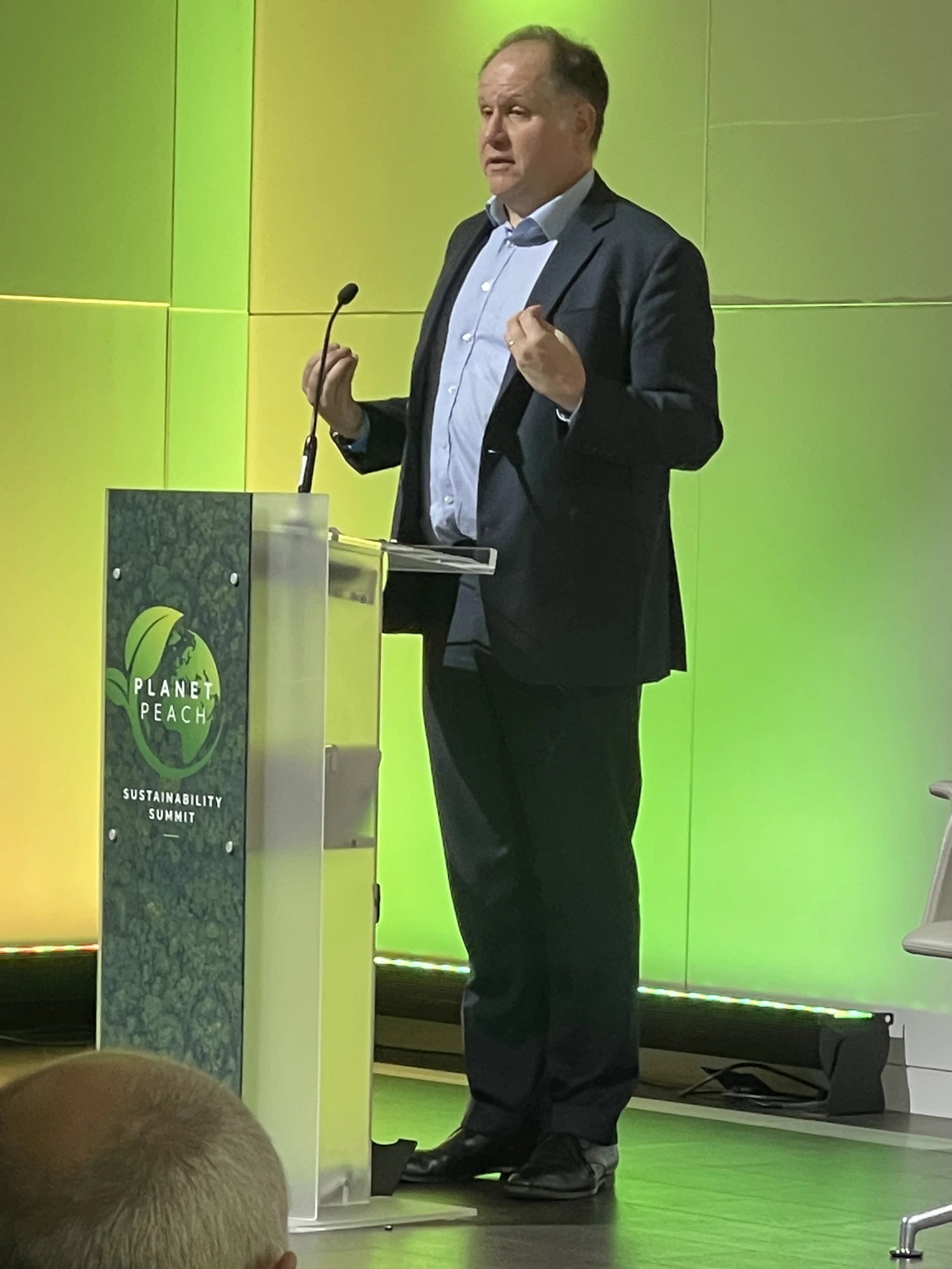50by25 at PLANET PEACH
Here is the skinny on what went down at Planet Peach 20/20 event last week - an event all about sustainability in food service operators including some of the biggest guns in hospitality across the UK, with an important key note address from author of the sadly ignored National Food Strategy and “Ravenous”, sustainability champion and Leon co-founder, Henry Dimbleby who was sure to put the cat amongst the pigeons.
I wrote this on the train on the way home so please forgive any overly passionate sentiment - I was fired up!
It’s not everyday that the leaders of some of the biggest hospitality companies and groups in the UK, gather together to discuss the weighty topic of “sustainability”, but that is exactly what happened this week at Planet Peach 20/20!
In a building belonging to the Royal College of Surgeons, we gathered in their starkly pristine theatre to hear from those who are at different stages of taking the steps towards sustainability in their businesses and it’s fair to say that the audience was enthralled.
Not least, since we opened with some revealing research studies on consumers which helped highlight the gaps of opportunity, from Deloitte:
BUY FROM…
59% higher income said they
“Always or often choose sustainable products”
44% middle income
42% lower income
WORK WITH…
46% of higher income respondents have considered switching to jobs to work for a more sustainable company.
20% middle income
13% lower-income
“You can pay my poverty but not my will.” This Shakespeare quote instantly sprang to mind!
INVEST IN…
70% of Private Equity Investors now see ESG as one of the Top 3 potential drivers of deal value. (PWC)
(You can always rely on the Big 4 to slice and dice the population by income!)
A foreboding slide followed: Climate is Changing - image on the screen of a Pub Available to Lease on a heavily flooded, evacuated street.
Emissions still rising; temperatures rising; frequency of weather events rising - flooding, extreme heat and storms
So the stage was set and a glimmer of hope emerged -
Opportunity in Adversity:
Prioritise Efficiency - take action in initiatives that save carbon AND cost (e.g. 50by25 - I had to add this here since 50by25 https://50by25.org offers an ideal turn key solution to so many of the issues that were spoken about)
Build Resilience - Redesign Operations to protect the supply chain
Enhance Your Brand - Share meaningful steps towards Net-Zero
Where is the biggest opportunity to change our environmental footprint as an industry?
Shared stats:
49% of pub emissions come from FOOD
20% from DRINKS
10% Energy
9% Operations
7% Other - waste, travel, pensions
5% Capital
3% Transport
Taken from a study incorporating 35k locations across UK carried out by Nutritics and Nielsen IQ: FOODPRINT
So what to do?
4 steps to Zero
Measure
Plan
Reduce
Comply
Top Ten Key Consumer Findings
Sustainability Matters to consumers: 70% say they actively try to lead an environmentally friendly
Influences dining locations : 44% say sustainability is important in their choice of venue to visit
Some people will pay extra for good practice: 34% say they are willing to spend more than usual with brands with strong sustainability credentials - although 35% will not
Younger adults are more heavily engaged : 18-34 yr olds are nearly twice as likely to pay more for sustainability than those 55+. Women, frequent visitors and Londoners all over-index for engagement too. Demographics matter!
Consumers want better communication - Only 23% think brands and venues communicate carbon footprint information well - while 34% say they aren’t doing enough.
Sourcing, waste and recycling matter most - Local sourcing, recycled materials, waste reduction initiatives and seasonal produce are the 4 most important sustainability factors in venue choice.
Better Data and Labelling can drive sales: 47% want more info about carbon footprints on menus and 41% say it would influence their order.
Most formal credentials do not resonate: Consumer awareness of environmental credentials like B Corp and Plastic Neutral Certification is low, but 49% have heard of Carbon Neutral status
A minority are not yet engaged: 23% of consumers say sustainability is unimportant in their choices of venues. Educating these diners and drinkers can win brand trust.
The Cost of Living Crisis is changing commitment: more consumers will become aware of the cost of good sustainable practice - making pricing more important. But even though some people are having to change their eating-habits, sustainability is not necessarily a casualty.
Mark Stratton of Fleet Street (a PR and Comms firm) spoke to how the data also highlighted that business leaders who he had presented this data to had expressed a reticence for wanting to talk about sustainability in public without having “cracked it”.
“Staff demand we do something – we need to show we’ve bought into the sustainability journey,” David Scott of NatWest spoke of the action required to satisfy employees and there was a huge opportunity spoken of by Mitchells and Butler’s Amy de Marsac whose online training delivered within a culture of learning sounded bang on the money.
Cheryl Chung spoke passionately about the need to say something, anything, else risk having the void filled for you by others. Having worked at global polluters like McDonalds and BooHoo, I expect she has seen her fair share of voids filled! She also talked of an “audience-led, employee-informed” strategic approach to sustainability which sounded sensible and made me wonder if activist groups within businesses driving change from within and influencing the higher ups into action, much like Vegan Leaders, would be useful in the hospitality industry.
This was one of the many inferences made to the invisible fear that was felt in the room - palpable during Henry Dimbleby’s speech where it felt like the whole room was holding it’s collective breath, hoping he would tell them that they can keep the meat on their menus, followed an audible sigh of disappointment when inevitably he told them that “Meat is Dead”.
What was also VERY noticeable was the lack of discussion around food specifically.
During one of the panels, Thomas Heier (Wagamama, CEO) spoke positively about how their strategy of including integrating vegan options into their menu, and not separating them out, drove sales and awareness, which in turn helped them to significantly decrease their environmental impact.
An interesting bunch of insights came from a study on “What Teams Want to See” from FoodPrint commissioned by Nutritics and CGA and carried out by Nielsen IQ.
Joint 1st: 91% of staff wanted to see a focus on Recycling and Reduction of Food Waste and Sustainable Packaging. Contrasted with the opening data this really underlined to me the desire for people to outsource the action that is required to make the world a better place by placing the focus on others to fix it. This was also echoed in the desire to see suppliers become more sustainable - creating a virtuous circle.
The tangibility of food waste has also shown FOH staff the need to tackle the issue of food waste yet the impact of the nature of the food itself remains hidden. Packaging is similiarly relatable as how quickly the bin gets filled up is a daily reminder of how much single use plastic we are accumulating into our environment. Focusing on the things that matter the least is lipstick on a pig!
Henry’s presentation touched on this crucial issue which is one of the barriers to swifter change - The Invisibility of Nature. Trees are silent, their roots invisible and fish are mobile - all features which deny our primary human senses of the ability to recognise and appreciate their value. Instead we end up with 29 KitKat varieties including breakfast cereal sold and marketed to children at eye level in grocery stores teaching them to give in to their most basic selves and making life even more difficult for parents who are facing 2 million impossible decisions on a daily basis.
Next was Staff Training and Education. I strongly believe that this relates to the desire of individuals to want their actions to correlate with a broader impact within their working lives and need employers not only to provide the tools with which these things can be actioned, but also to measure and reward those efforts and incorporate them into their remuneration, learning and development progress (PIPs).
Using local/sustainably sourced ingredients - sourcing and labelling on menus and BOH was something that 84% of employees wanted to see.
We are living in the age of overwhelm, so it is time to get back to basics.
Here is my list for Successful Sustainability Strategy for FS:
Keep it simple and integrate sustainability into every department to ensure that you are making progress in all areas.
Communicate with your teams and externally; the power of strong, fallible communication is not to be underestimated - whilst it may seem risky, silence is far more dangerous.
Invest in your people through training programs and use technology to track their increasing awareness and improvement. Strategy + remuneration = RESULTS!
Tackle the enormous COW in the room - if you aren’t addressing the food, you are ignoring 50% of your impact.
Bring in experts to help you make the transition, educate on Best Practice and make use of marketers to help tell the story of your journey. Your customer cares, but wants to hear about it in the right way and at the right time.
And of course, sign up for 50by25! The benefits to your business and the planet are enormous but include:
A clear signal that you are aware of the need to change and innovate your menu to reflect the harm that our current food system has on the planet.
With My Emissions measuring your menu impact at sign up and at the end of the campaign, you will measure the results of your efforts.
Free help and access to the top chefs and innovators who have already worked out the secrets behind making plant-based food options irresistible to your customers (HINT: don’t call them vegan!)
Find out more https://50by25.org

